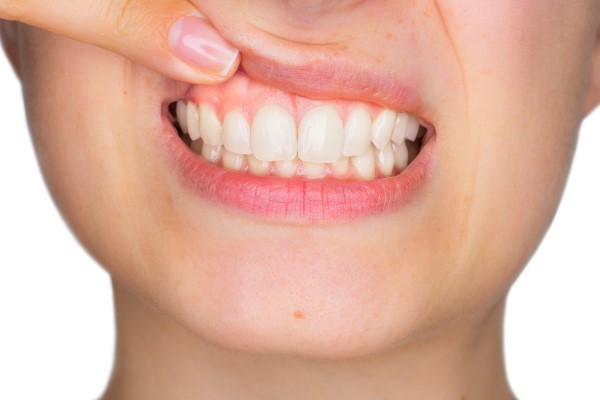When Is Gum Disease Treatment Necessary?

Gum disease is a serious condition that can result in a need for periodontal treatment. Periodontal treatment is often necessary to destroy the infection and prevent it from worsening. Often, without treatment, a case of gum disease can become advanced, resulting in tooth loss, receding gums, and even jaw deterioration, all of which can be detrimental and irreversible.
Due to how serious gum disease is, it is important to look for signs indicating a need for general dentistry treatment. Keep reading to find out when periodontal treatment is necessary.
Indicators that periodontal treatment is needed
Outlined below are a few warning signs of gum disease. These signs should never go ignored and often require immediate periodontal treatment.
Red or white gums
Periodontal treatment is likely needed when an individual notices that their gums have red or white areas or patches on them. Gum disease often shows itself in the form of atypical gum colors, which is why it is important to inspect the gums regularly and carefully. In addition, soft tissues that are not pink are a cause of concern and should be looked at by a general dentist right away.
Inflammation or swelling
When the gums are swollen or inflamed, then it also likely means that periodontal treatment is needed. The gums should never appear bulging or puffy, as this indicates a serious stage of gum disease. Until patients can undergo a general dentistry evaluation, taking an over-the-counter anti-inflammatory medication can help reduce the symptoms.
Bleeding
From time to time, the gums may bleed when brushing or flossing, which is normal. However, an abnormal symptom is excessive bleeding gums. Individuals who suffer from gum disease will likely experience bleeding gums every time they brush or floss and sometimes when eating too. In severe cases of gum disease, there might even be bleeding when no activity is taking place. This indicates a serious case of gum disease. Periodontal treatment should be sought if there are any signs of abnormal bleeding.
Pain
Later stages of gum disease often cause pain in the gums because the infection has made its way to the nerves. Sore gums or sharp pains in the soft tissues should not be ignored, as both indicate a need for periodontal treatment from a dentist. The patient can take over-the-counter pain medication to remedy the discomfort until a dentist can start treatment.
Other things to note
Treatment for gum disease is necessary in order to maintain good oral health. Additionally, individuals preparing to undergo an intense dentistry procedure may need to have their gum disease tackled first. Examples include dental implant placement or a complete smile makeover. Dentists will require a 100% healthy mouth prior to starting the process, which is why patients should immediately take any signs of gum disease to a general dentist.
The gums play a vital role in the entire oral cavity as they keep the teeth in the proper position and protect the bone. Because of their importance, it is crucial to maintain good gum health. There are a few ways to do this, thus reducing the chances that gum disease ever develops.
How to maintain good gum health:
Brush the teeth and along the gum line at least twice a day or after every meal
Floss once a day carefully and gently
Use different pieces of floss for the top and bottom arch of teeth. This reduces the chances of transmitting bacteria
Rinse with salt water or a non-alcoholic mouthwash to rid the oral cavity of bacteria
Visit the dentist at least twice a year or every six months
Avoid excessive alcohol consumption and tobacco use
Eat a diet consisting of healthy foods, such as fruits and vegetables
These recommendations can go a long way in avoiding gum disease as a whole and maintaining general oral health.
Get started with gum disease treatment
The warning signs listed above indicate a need for periodontal treatment. However, there are also times when gum disease is present, but there may not be any indicators, which is why it is important to see a dentist for check-ups regularly. Dentists are trained to catch warning signs that may not be as obvious to the naked eye. In addition, undergoing routine dental cleanings and examinations can help avoid gum disease and allow an individual to start treatment sooner rather than later. Reach out today to learn more or to get started with a consultation.
Request an appointment here: https://www.southerncalsmiles.com or call Southern Cal Smiles: Susan Fredericks, D.D.S, M.P.H. at (818) 657-8055 for an appointment in our Woodland Hills office.
Check out what others are saying about our dental services on Yelp: Gum Disease in Woodland Hills, CA.
Related Posts
Gum disease is also known as periodontal disease. This is a condition that causes inflammation of the tissue around the patient’s teeth. It is caused by bacteria building up in the area. Keep reading to learn about some of the symptoms of gum disease.Periodontal disease is a progressive condition, meaning it gets worse over time.…
Dental bonding is an effective restorative procedure for many dental issues, including tooth sensitivity. Read on to learn more about dental bonding. Dental sensitivity affects almost everyone at some point in their lives. Very hot or cold foods or liquids may cause a person’s teeth to become irritated. Knowing how to manage or approach sensitivity…
Dental bonding is not a permanent solution. This is in contrast to dental veneers, which are considered a permanent solution and are used for similar reasons as dental bonding. However, dental bonding can last for several years if the teeth are cared for properly.The following discussion highlights what the dental bonding procedure involves and why…
When accidents happen that affect the mouth and teeth, most people visit an emergency dentist to have a broken or missing tooth repaired; however, these dentists are also capable of handling problems that stem from periodontal issues. While gum disease usually progresses slowly, it can cause emergency situations, and knowing when to visit a clinic…


